雅思写作高分范文:教育花费
- 格式:doc
- 大小:24.03 KB
- 文档页数:3

教育支出英文作文英文:Education expenditure is an important topic thataffects individuals, families, and society as a whole. As a student, I have personally experienced the impact of education expenditure on my life. In my opinion, education expenditure is necessary and worth the investment.Firstly, education expenditure is essential for individuals to acquire knowledge and skills. Education can provide individuals with opportunities to learn and develop their potential, which can benefit their future career and personal life. For example, I have invested in language courses to improve my communication skills, which has helped me to better express myself and connect with people from different cultures.Secondly, education expenditure can also benefit families. Parents who invest in their children's educationcan provide them with a better future and a higher quality of life. For instance, my parents paid for my university tuition, which has allowed me to pursue my dream career and achieve financial stability.Lastly, education expenditure can contribute to the development of society. A well-educated society can lead to economic growth and social progress. For example, countries with high education expenditure tend to have a higher standard of living and better public services.In conclusion, education expenditure is a worthwhile investment that can benefit individuals, families, and society. It can provide individuals with knowledge and skills, benefit families by improving their children's future prospects, and contribute to the development of society.中文:教育支出是一个重要的话题,影响着个人、家庭和整个社会。
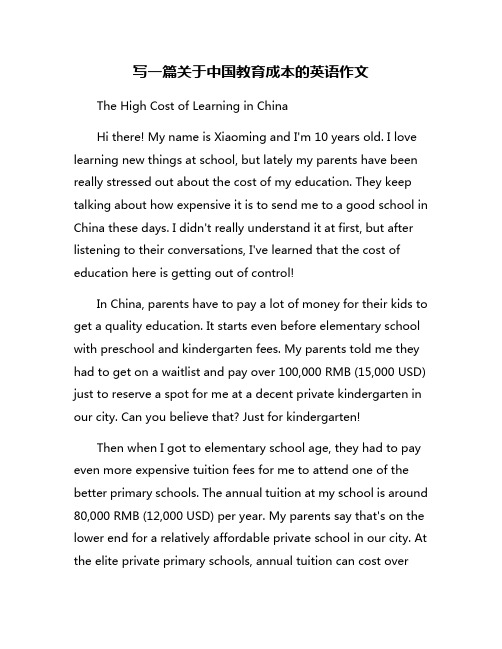
写一篇关于中国教育成本的英语作文The High Cost of Learning in ChinaHi there! My name is Xiaoming and I'm 10 years old. I love learning new things at school, but lately my parents have been really stressed out about the cost of my education. They keep talking about how expensive it is to send me to a good school in China these days. I didn't really understand it at first, but after listening to their conversations, I've learned that the cost of education here is getting out of control!In China, parents have to pay a lot of money for their kids to get a quality education. It starts even before elementary school with preschool and kindergarten fees. My parents told me they had to get on a waitlist and pay over 100,000 RMB (15,000 USD) just to reserve a spot for me at a decent private kindergarten in our city. Can you believe that? Just for kindergarten!Then when I got to elementary school age, they had to pay even more expensive tuition fees for me to attend one of the better primary schools. The annual tuition at my school is around 80,000 RMB (12,000 USD) per year. My parents say that's on the lower end for a relatively affordable private school in our city. At the elite private primary schools, annual tuition can cost over200,000 RMB (30,000 USD)! That's more than what many families in China make in an entire year.On top of the insane tuition costs, there are also a bunch of other fees that my parents have to pay. The school charges extra fees for things like extracurricular activities, field trips, lunch meals, uniforms, and supply fees. My mom calculated that they end up paying around 20,000 RMB (3,000 USD) in additional mandatory fees to the school each year.But that's not even the half of it! To give me a competitive edge, my parents also have to pay for private tutoring, extracurricular enrichment classes, and educational resources on top of the school fees. It's become the norm in China for kids to have multiple private tutors to help with core subjects like math, Chinese, and English. My tutors alone cost around 2,000 RMB (300 USD) per month each.I also take various after-school enrichment classes like computer coding, robotics, art, music, and Chinese yo-yo. Each of those classes costs at least 200 RMB (30 USD) per session. My parents easily spend over 4,000 RMB (600 USD) per month on my enrichment classes.My dad also pays for me to use all sorts of online learning apps,VideoYou channels, and educational subscription servicesto supplement my learning. He gets really annoyed when I ask for the newest popular learning app or tool that all my friends are using. He argues that the education industry is totally taking advantage of parents' willingness to spend whatever it takes to give their kids every advantage. I have to admit, he kind of has a point - those learning resources really add up quickly!From what I've gathered by eavesdropping on their conversations, the total cost of my elementary school education is already adding up to around 250,000 RMB (37,000 USD) per year for my parents! That's just for my basic education as a10-year-old. My parents are absolutely dreading my future high school and university fees, which I've heard can easily exceed 300,000 RMB (45,000 USD) per year at the upper-tier schools.They always complain about how unfair the education system is in China and how it puts such a huge financial burden on families. I feel really bad that they're so stressed about the costs. Sometimes I wish I could just go to a simple public school for free like kids in other countries, but my parents insist that I need to attend a prestigious private school to have any chance at getting into a top university and securing a decent job later on.I don't fully understand the reasons behind the exorbitant education costs in China. From what I've overheard, it hassomething to do with factors like high demand, low supply of quality schools, lack of government funding, excessive premium on elite education, corruption, and greedy private institutions. Whatever the causes, it's certainly putting immense pressure on my parents' finances. Sometimes I worry about how we'll ever be able to afford my education past primary school.Despite the costs, my parents are adamant that getting me a high-quality education is the most important investment they can make. They constantly remind me how crucial it is for me to work hard in school so that their sacrifices are worth it. I really do try my best, but it's hard not to feel that intense pressure and guilt over the financial burdens I'm placing on my family just by being a student.I know I'm still young, but the costs of my education are already something that weighs heavily on my mind. I can only imagine how much more stressful it will become as I get older and the fees continue increasing. Part of me wishes schools and learning resources weren't so outrageously overpriced in China. But another part of me is grateful that despite the heavy financial strain, my parents are still doing everything they can to provide me with the best educational opportunities possible.I hope that by the time I grow up, things will be different and more affordable for the next generation of students in China. Getting a quality education shouldn't have to be so punishingly costly for average families. But for now,I'll just keep studying as hard as I can to make sure my parents' immense investment in my learning doesn't go to waste. Wish me luck!。
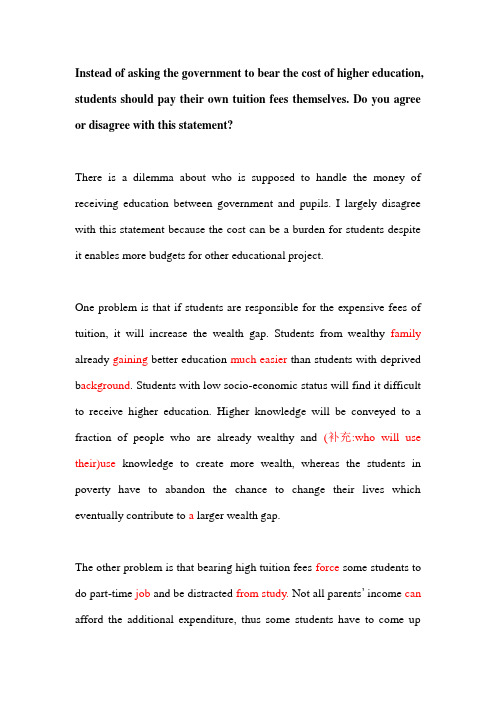
Instead of asking the government to bear the cost of higher education, students should pay their own tuition fees themselves. Do you agree or disagree with this statement?There is a dilemma about who is supposed to handle the money of receiving education between government and pupils. I largely disagree with this statement because the cost can be a burden for students despite it enables more budgets for other educational project.One problem is that if students are responsible for the expensive fees of tuition, it will increase the wealth gap. Students from wealthy family already gaining better education much easier than students with deprived b ackground. Students with low socio-economic status will find it difficult to receive higher education. Higher knowledge will be conveyed to a fraction of people who are already wealthy and(补充:who will use their)use knowledge to create more wealth, whereas the students in poverty have to abandon the chance to change their lives which eventually contribute to a larger wealth gap.The other problem is that bearing high tuition fees force some students to do part-time job and be distracted from study. Not all parents’ income can afford the additional expenditure, thus some students have to come upwith a solution to alleviate the economical burden of their parents. It is the qualification that corporations value, However, many undergraduates struggle to secure full-time employment, as most can only find part-time jobs. Their leisure time can not be used to digest the knowledge or rest for better learning status but is instead(补充) wasted in meaningless and tiring jobs,eventually resulting the decline of their academic achievement.On the other hand, students pay the cost of education is beneficial for the(补充) government to lighten the stress of higher education expense. More budgets are available for other educational projects, for example, the(补充)authority devote extra money in primary and middle school education to improve the young pupils’learning environment or to provide free education, which will enlarge(expand)the scale of basic education.To sum up, I largely disagree with the statement that students ought to deal with the cost of education by themselves rather than the(补充)government to cover the cost of higher tuition. This could cause problems like widening the wealth gap and reducing(the quality of education)of learning quality even if it can support other educational issues. +"There is a dilemma about who is supposed to handle the money of receiving education between government and pupils. I largely disagree with this statement because the cost can be a burden for students despite it enables more budgets for other educational project.One problem is that if students are responsible for the expensive fees of tuition, it will increase the wealth gap. Students from wealthy families already gain better education much more easily than students with deprived backgrounds. Students with low socio-economic status will find it difficult to receive higher education. Higher knowledge will be conveyed to a fraction of people who are already wealthy and who will use their knowledge to create more wealth, whereas the students in poverty have to abandon the chance to change their lives which eventually contribute to a larger wealth gap.The other problem is that bearing high tuition fees forces some students to do part-time jobs and be distracted from their studies. Not all parents’ income is able to afford the additional expenditure, thus some students have to come up with a solution to alleviate the economic burden of their parents. It is the qualification that corporations value, however, many undergraduates struggle to secure full-time employment, as most can only find part-time jobs. Their leisure time cannot be used to digest knowledgeor rest for better learning conditions, but is instead wasted in meaningless and tiring jobs, eventually resulting in a decline of their academic achievement.On the other hand, students paying the cost of education is beneficial for the government to reduce the stress of higher education expense. More budgets are available for other educational projects, for example, the authority devotes extra money to primary and middle school education to improve the young pupils’ learning environmen t or to provide free education, which will expand the scale of basic education.To sum up, I largely disagree with the statement that students ought to deal with the cost of education by themselves rather than the government covering the cost of higher tuition. This could cause problems like widening the wealth gap and reducing the quality of education, even if it can support other educational issues."。
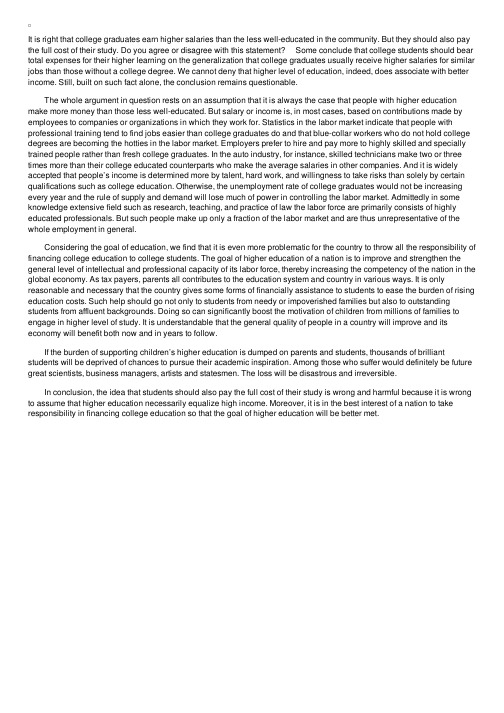
It is right that college graduates earn higher salaries than the less well-educated in the community. But they should also pay the full cost of their study. Do you agree or disagree with this statement? Some conclude that college students should bear total expenses for their higher learning on the generalization that college graduates usually receive higher salaries for similar jobs than those without a college degree. We cannot deny that higher level of education, indeed, does associate with better income. Still, built on such fact alone, the conclusion remains questionable. The whole argument in question rests on an assumption that it is always the case that people with higher education make more money than those less well-educated. But salary or income is, in most cases, based on contributions made by employees to companies or organizations in which they work for. Statistics in the labor market indicate that people with professional training tend to find jobs easier than college graduates do and that blue-collar workers who do not hold college degrees are becoming the hotties in the labor market. Employers prefer to hire and pay more to highly skilled and specially trained people rather than fresh college graduates. In the auto industry, for instance, skilled technicians make two or three times more than their college educated counterparts who make the average salaries in other companies. And it is widely accepted that people’s income is determined more by talent, hard work, and willingness to take risks than solely by certain qualifications such as college education. Otherwise, the unemployment rate of college graduates would not be increasing every year and the rule of supply and demand will lose much of power in controlling the labor market. Admittedly in some knowledge extensive field such as research, teaching, and practice of law the labor force are primarily consists of highly educated professionals. But such people make up only a fraction of the labor market and are thus unrepresentative of the whole employment in general. Considering the goal of education, we find that it is even more problematic for the country to throw all the responsibility of financing college education to college students. The goal of higher education of a nation is to improve and strengthen the general level of intellectual and professional capacity of its labor force, thereby increasing the competency of the nation in the global economy. As tax payers, parents all contributes to the education system and country in various ways. It is only reasonable and necessary that the country gives some forms of financially assistance to students to ease the burden of rising education costs. Such help should go not only to students from needy or impoverished families but also to outstanding students from affluent backgrounds. Doing so can significantly boost the motivation of children from millions of families to engage in higher level of study. It is understandable that the general quality of people in a country will improve and its economy will benefit both now and in years to follow. If the burden of supporting children’s higher education is dumped on parents and students, thousands of brilliant students will be deprived of chances to pursue their academic inspiration. Among those who suffer would definitely be future great scientists, business managers, artists and statesmen. The loss will be disastrous and irreversible. In conclusion, the idea that students should also pay the full cost of their study is wrong and harmful because it is wrong to assume that higher education necessarily equalize high income. Moreover, it is in the best interest of a nation to take responsibility in financing college education so that the goal of higher education will be better met.。
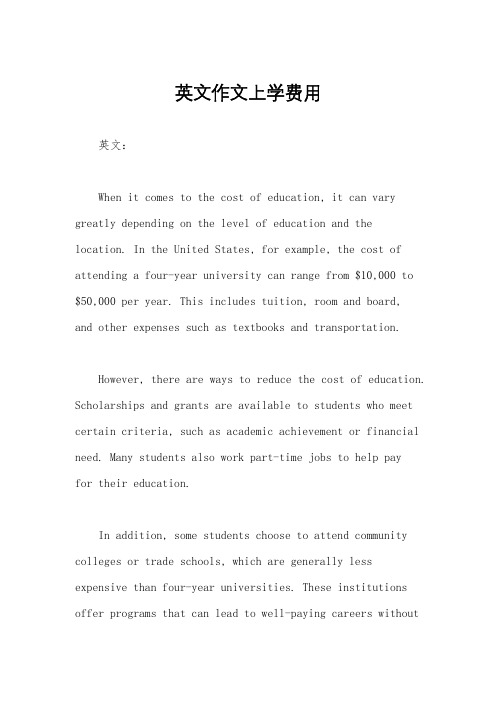
英文作文上学费用英文:When it comes to the cost of education, it can vary greatly depending on the level of education and the location. In the United States, for example, the cost of attending a four-year university can range from $10,000 to $50,000 per year. This includes tuition, room and board,and other expenses such as textbooks and transportation.However, there are ways to reduce the cost of education. Scholarships and grants are available to students who meet certain criteria, such as academic achievement or financial need. Many students also work part-time jobs to help payfor their education.In addition, some students choose to attend community colleges or trade schools, which are generally less expensive than four-year universities. These institutions offer programs that can lead to well-paying careers withoutthe high cost of a traditional university education.Overall, the cost of education can be a significant financial burden for many families. However, with careful planning and research, it is possible to find ways to make education more affordable and accessible.中文:说到教育费用,它可以根据教育水平和地点的不同而大不相同。
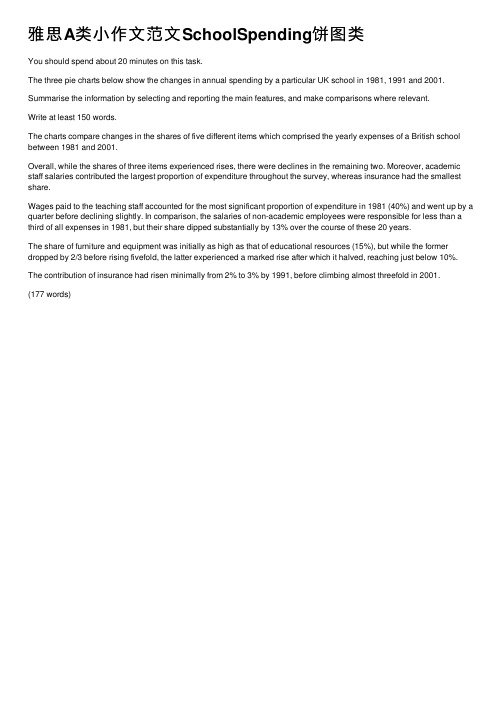
雅思A类⼩作⽂范⽂SchoolSpending饼图类You should spend about 20 minutes on this task.The three pie charts below show the changes in annual spending by a particular UK school in 1981, 1991 and 2001. Summarise the information by selecting and reporting the main features, and make comparisons where relevant.Write at least 150 words.The charts compare changes in the shares of five different items which comprised the yearly expenses of a British school between 1981 and 2001.Overall, while the shares of three items experienced rises, there were declines in the remaining two. Moreover, academic staff salaries contributed the largest proportion of expenditure throughout the survey, whereas insurance had the smallest share.Wages paid to the teaching staff accounted for the most significant proportion of expenditure in 1981 (40%) and went up by a quarter before declining slightly. In comparison, the salaries of non-academic employees were responsible for less than a third of all expenses in 1981, but their share dipped substantially by 13% over the course of these 20 years.The share of furniture and equipment was initially as high as that of educational resources (15%), but while the former dropped by 2/3 before rising fivefold, the latter experienced a marked rise after which it halved, reaching just below 10%. The contribution of insurance had risen minimally from 2% to 3% by 1991, before climbing almost threefold in 2001.(177 words)。

孩子教育支出情况英语作文Title: The Expenditure on Children's Education。
In today's society, the expenditure on children's education has become a significant concern for many families. As parents, we are constantly striving to provide the best educational opportunities for our children, often facing financial challenges along the way. In this essay,we will delve into the various aspects of children's education expenditure, exploring its importance, challenges, and possible solutions.Firstly, it is essential to understand why investing in children's education is crucial. Education lays the foundation for a child's future success and plays a pivotal role in shaping their character, intellect, and skills. Quality education not only opens doors to better career prospects but also fosters critical thinking, creativity, and lifelong learning habits. Therefore, parents arewilling to allocate a significant portion of their incometowards ensuring their children receive a well-rounded education.However, the cost of education continues to rise, posing financial burdens for many families. From tuition fees to extracurricular activities, textbooks, and educational resources, the expenses can quickly add up. Moreover, socioeconomic factors such as income inequality and inflation further exacerbate the financial strain on parents, especially those from lower-income backgrounds. As a result, some children may not have equal access to educational opportunities, widening the gap between the privileged and the underprivileged.To address these challenges, governments and educational institutions must collaborate to make education more accessible and affordable for all children. This could involve implementing policies to reduce tuition fees, providing financial assistance to low-income families, and investing in public education infrastructure. Additionally, promoting digital learning platforms and open educational resources can help reduce the cost of textbooks andlearning materials.Furthermore, parents can take proactive steps to manage their children's education expenditure more effectively. This includes creating a budget specifically for education-related expenses, prioritizing spending on essential items, and exploring alternative learning options such as homeschooling or online courses. Additionally, parents can encourage their children to apply for scholarships, grants, and other forms of financial aid to alleviate the financial burden.In conclusion, the expenditure on children's education is a significant aspect of parenting that requires careful consideration and planning. While the cost of education may present challenges for many families, it is essential to prioritize investing in our children's future. By working together as parents, educators, and policymakers, we can ensure that every child has access to quality education, regardless of their financial circumstances. Only then can we truly empower the next generation to succeed and thrive in an increasingly competitive world.This essay is a reflection of the growing concern and effort to address the financial challenges associated with children's education. By acknowledging the importance of education and proposing solutions to make it more accessible, it aims to inspire positive change and promote equal opportunities for all children.。

学校花销雅思范文Title: Balancing School Expenditure for Optimal Educational OutcomesIn the realm of contemporary education, the effective allocation of financial resources is paramount to fostering a conducive learning environment and enhancing the overall academic experience of students. The debate surrounding school expenditure often revolves around whether the funds are being wisely invested in areas that directly benefit students' learning outcomes or if they are being misspent on less critical aspects. This essay will delve into the rationale behind prudent school spending, the key areas of investment, and the implications of balancing these expenditures. Firstly, the rationale for prudent spending stems from the recognition that education is a fundamental right and a crucial investment in the future. Governments and private institutions alike are entrusted with ensuring that educational funds are used to maximize learning outcomes and equip students with the skills necessary for success in an ever-evolving world. This necessitates a strategic approach to spending, prioritizing areas that have the greatest potential to enhance teaching quality, student engagement, and long-term development.Secondly, key areas of investment in school expenditure include educational resources, extracurricular activities, and infrastructural improvements. Educational resources, such as updated textbooks, digital learning tools, and professional development programs for teachers, are essential for keeping pace with educational advancements and ensuring that students receive a modern, comprehensive education. Extracurricular activities, meanwhile, offer students opportunities for personal growth, teamwork, and leadership development, which are often overlooked but equally important aspects of their education. Lastly, infrastructural improvements, such as upgrading classrooms, laboratories, and sports facilities, can significantly enhance the physical learning environment and contribute to a more positive school culture.However, balancing these expenditures is crucial to avoid misallocation of funds and ensure sustainability. It is imperative for schools to conduct regular assessments of their spending patterns, identifying areas where savings can be made without compromising the quality of education. For instance, leveraging technology to streamline administrative processes can free up funds for more impactful investments. Additionally, fostering partnerships with external organizations and seeking grants canhelp supplement school budgets, allowing for greater flexibility in allocating resources.In conclusion, the effective management of school expenditure is vital to achieving optimal educational outcomes. By prioritizing investments in educational resources, extracurricular activities, and infrastructural improvements, while maintaining a balanced and sustainable budget, schools can create a thriving learning environment that prepares students for the challenges of the 21st century. Ultimately, it is the responsible stewardship of these funds that will determine the long-term success and impact of our educational institutions.。
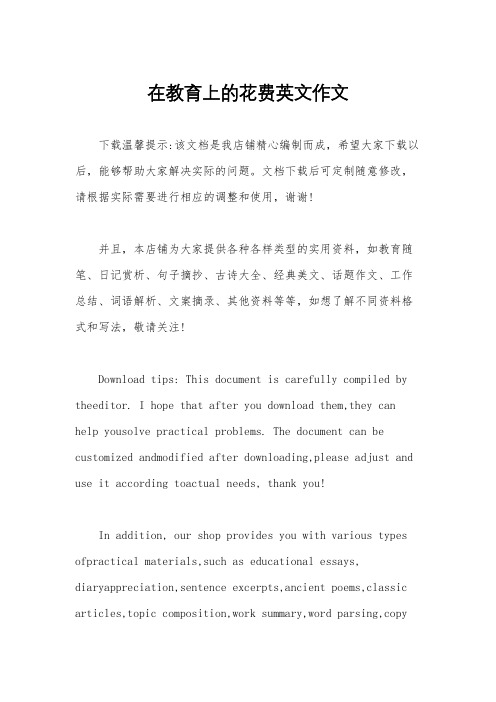
在教育上的花费英文作文下载温馨提示:该文档是我店铺精心编制而成,希望大家下载以后,能够帮助大家解决实际的问题。
文档下载后可定制随意修改,请根据实际需要进行相应的调整和使用,谢谢!并且,本店铺为大家提供各种各样类型的实用资料,如教育随笔、日记赏析、句子摘抄、古诗大全、经典美文、话题作文、工作总结、词语解析、文案摘录、其他资料等等,如想了解不同资料格式和写法,敬请关注!Download tips: This document is carefully compiled by theeditor. I hope that after you download them,they can help yousolve practical problems. The document can be customized andmodified after downloading,please adjust and use it according toactual needs, thank you!In addition, our shop provides you with various types ofpractical materials,such as educational essays, diaryappreciation,sentence excerpts,ancient poems,classic articles,topic composition,work summary,word parsing,copyexcerpts,other materials and so on,want to know different data formats andwriting methods,please pay attention!Education is a valuable investment in our future. The cost of education includes tuition fees, textbooks, school supplies, and other expenses. Many families struggle to afford these costs, but education is essential for success in today's competitive world.The rising cost of education has become a major concern for students and parents alike. Some students are forced to take out loans or work part-time jobs to cover their expenses. This financial burden can be overwhelming and may deter some students from pursuing higher education.Despite the high cost, education is still worth the investment. It opens doors to better job opportunities and higher earning potential. Education also provides valuable knowledge and skills that can help individuals succeed in their chosen careers.Scholarships and financial aid are available to helpstudents offset the cost of education. Many organizations and institutions offer scholarships based on academic achievement, financial need, or other criteria. Students should explore these options to make education more affordable.In conclusion, the cost of education is a significant challenge for many families, but it is a necessary investment in our future. By finding ways to make education more affordable, we can ensure that all students have access to the opportunities that come with a quality education.。
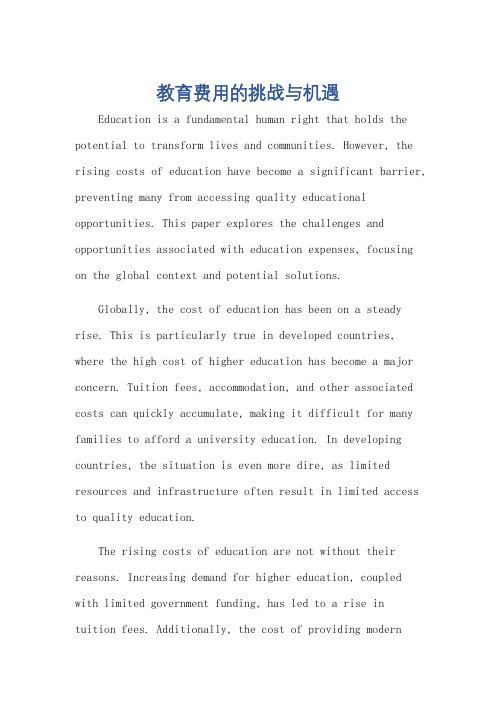
教育费用的挑战与机遇Education is a fundamental human right that holds the potential to transform lives and communities. However, the rising costs of education have become a significant barrier, preventing many from accessing quality educational opportunities. This paper explores the challenges and opportunities associated with education expenses, focusing on the global context and potential solutions.Globally, the cost of education has been on a steady rise. This is particularly true in developed countries, where the high cost of higher education has become a major concern. Tuition fees, accommodation, and other associated costs can quickly accumulate, making it difficult for many families to afford a university education. In developing countries, the situation is even more dire, as limited resources and infrastructure often result in limited access to quality education.The rising costs of education are not without their reasons. Increasing demand for higher education, coupledwith limited government funding, has led to a rise intuition fees. Additionally, the cost of providing moderneducational facilities, such as libraries, laboratories,and technology, has also contributed to the increasing expenses. However, these costs must be balanced with the need to ensure that education remains accessible and affordable for all.The high cost of education has several negative consequences. Firstly, it can limit social mobility, preventing individuals from escaping poverty and achieving their full potential. Secondly, it can create a divide between those who can afford education and those who cannot, leading to social and economic disparities. Finally, the high cost of education can discourage innovation and creativity, as individuals may be reluctant to pursuefields that do not offer immediate financial rewards.However, the challenges posed by rising education costs also present opportunities for reform and innovation. Governments and educational institutions can seek toaddress the issue by increasing funding, improving infrastructure, and exploring alternative funding models. For example, the introduction of loan schemes and grantscan help alleviate the financial burden on students andfamilies. Additionally, the development of online education and open educational resources can provide more accessible and affordable educational options.Moreover, collaboration and partnerships between governments, private sector, and educational institutions can foster innovation and create more sustainable solutions. By leveraging technology and innovative teaching methods, educational institutions can improve the quality of education while reducing costs. Similarly, private sector involvement can help generate additional resources and create more job opportunities in the education sector.In conclusion, the rising costs of education pose significant challenges but also offer opportunities for reform and innovation. It is crucial that we address these issues comprehensively, ensuring that education remains accessible and affordable for all. By doing so, we can ensure that the benefits of education are shared by all, leading to more inclusive and sustainable development.**教育费用的挑战与机遇**教育是一项基本人权,具有改变个人和社区生活的潜力。

以教育费用为题的英语作文示例回答如下1:英文回答:The topic of education costs is an important issue that affects individuals and societies worldwide. In recent years, the cost of education has been steadily increasing, making it a significant financial burden for many families.One of the main reasons for the rising education costs is the increasing demand for higher education. As more students aspire to attend college or university, the competition for limited spots has intensified. This has led to the need for additional resources, such as faculty, facilities, and technology, which contribute to the overall cost.Another factor contributing to the high education costs is the increasing expenses associated with educational materials and resources. Textbooks, online subscriptions, and other learning materials have become increasingly expensive, putting additional financial strain on students and their families.Furthermore, the cost of living, including accommodation and daily expenses, often adds to the overall education expenses. Students studying away from home may need to pay for housing, transportation, and other living costs, which can significantly increase the financial burden.In response to these escalating costs, governments and educational institutions have implemented various measures to alleviate the financial burden on students and their families. Scholarships, grants, and student loans are commonly offered to assist students with their educational expenses. Additionally, some countries have introduced policies to regulate tuition fees and ensure that education remains accessible to all.In conclusion, the issue of education costs is a complex and multifaceted one. While the increasing expenses may pose challenges to many individuals and families, efforts are being made to provide financial assistance and make education more affordable. It is crucial to continue exploring innovative solutions to address this issue and ensure that education remains accessible to all.中文回答:教育费用是一个影响全球个人和社会的重要问题。

家庭教育支出过高英语作文In recent years, the issue of escalating family education expenses has become a topic of concern for many parents and society at large. The following essay will explore the reasons behind this trend, its implications, and potential solutions to manage these costs effectively.Reasons for High Family Education Expenses1. Quality Education Pursuit: Parents are willing to invest heavily in their children's education to ensure they receive the best possible start in life. This often involvesenrolling them in prestigious schools or hiring private tutors.2. Extracurricular Activities: The belief that a well-rounded education includes a variety of extracurricular activities has led to additional costs for lessons, equipment, and participation fees in sports, arts, and other hobbies.3. Educational Materials: The rise of digital learning tools and the need for individual learning materials such as textbooks, online subscriptions, and educational apps contribute to the overall expense.4. Competitive Pressure: In a competitive academic environment, families feel the pressure to give theirchildren an edge, which can lead to spending on advancedcourses, test preparation, and other academic enhancements.Implications of High Education Costs1. Financial Stress: High education costs can lead to significant financial strain on families, potentially affecting other aspects of their quality of life.2. Inequality: There is a risk that only those who can afford these expenses will be able to provide their children with the perceived best education, leading to increased social and economic disparities.3. Child Stress: The pressure to perform well academically to justify the high costs can lead to stress and anxiety in children.Potential Solutions1. Government Intervention: Governments can play a role by increasing funding for public education and providing subsidies or tax relief for educational expenses.2. Educational Reform: Schools can focus on providing a more inclusive and comprehensive curriculum that reduces the need for additional tutoring or extra classes.3. Community Resources: Utilizing community resources such as libraries and after-school programs can help reduce the reliance on expensive private educational services.4. Parental Awareness: Parents should be made aware of the potential for "educational inflation" and encouraged to make cost-effective choices that still provide a quality education for their children.In conclusion, while the desire for the best education for one's children is understandable, the financial burden it places on families is a significant concern. It requires a multifaceted approach, involving both individual and collective efforts, to address the issue of high family education expenses.。

关于教育支出的英语作文Self-Education Education plays a great role in our life.But, real education begins with self education. That is to educate ourselves. l have had such experience. When l finish reading a good book, which is informative and exciting, l am lost deep in thoughts and enlightened.Something or somebody ordinary in life, once written in books, after careful reading and thinking, will reveal truth and philosophy. When l succeed or fad, get praised or criticized,happy or sad, l can find in books a good mirror to reflect and guide me l cannot but put myself upon thinking,"What was l? What will l he?"At this time, my mind is open and l am my sincere self.l am having a dialogue with myself, with my conscience. Without my knowing it, 1am educating myself. So you can see by self-education.I mean thinking and contradicting within the mind. ln the process of thinking and contradicting l have recollections and app raisalof myself. Then I make decisions a e co rdi ngly and keep myself in control of my thoughts and actions in the hope that l better myself in character, behavior, virtue and manner. Self-education is aneffective way to make one noble minded, more able and intelligent and to perfect oneself.If a man keeps receiving education and educating himself, he is sure to be one cut above others.The sim psons, and Futurama for entertainment. l think i watch wayyyy too much simpsons,and the crap thing is that it's always the same episodes because channel TEN is juat a littletight-fisted.l also happen to think it suxors there's only four seasons of futurama.'l don't care how many eyes he has - as long as it's less than five.'My other favourite is mythbusters.l mean, in what other show do they try to dislodgeconcrete from a mixer using... a few hundred bags of explosives?。

明年教育开支英语作文Next Year's Education Expenditure。
Education plays a vital role in the development of a country. It not only equips individuals with knowledge and skills but also contributes to the overall progress of society. Therefore, it is crucial for governments to allocate sufficient funds for education. In this essay, we will explore the importance of increasing education expenditure next year and propose some effective measures to ensure the optimal use of these funds.To begin with, increasing education expenditure next year is essential to improve the quality of education. With more funds, schools can hire well-qualified teachers, provide better facilities, and offer a wider range of educational resources. This will enhance the learning experience for students and enable them to acquire a well-rounded education. Additionally, increased expenditure can be used to develop innovative teaching methods andimplement educational reforms, which will further enhance the quality of education.Moreover, increasing education expenditure can help address the issue of educational inequality. In many countries, there is a significant disparity in educational opportunities between urban and rural areas, as well as between different socioeconomic groups. By allocating more funds, governments can invest in educational programs and initiatives specifically targeting disadvantaged groups. This will help bridge the gap and ensure equal access to quality education for all.Furthermore, increasing education expenditure can have long-term economic benefits. Education is closely linked to economic growth and development. A well-educated workforce is more productive and innovative, which can drive economic progress. By investing in education, governments can equip individuals with the necessary skills and knowledge to contribute to the economy. This, in turn, can lead to higher employment rates, increased productivity, andoverall economic prosperity.In order to ensure the optimal use of increased education expenditure, several measures can be implemented. Firstly, there should be strict monitoring and evaluation systems in place to ensure transparency and accountability in the use of funds. This will help identify any misuse or misallocation of resources and take appropriate action. Additionally, governments should encourage collaboration between educational institutions and the private sector to leverage additional resources and expertise. Public-private partnerships can help fund educational initiatives and bring innovative ideas to the table.Furthermore, it is important to invest in teacher training and professional development. Well-trained and motivated teachers are crucial for the success of any education system. By providing opportunities for continuous learning and growth, teachers can enhance their teaching skills and keep up with the latest educational trends. This will ultimately benefit students and contribute to the overall improvement of the education system.In conclusion, increasing education expenditure next year is of utmost importance. It can improve the quality of education, address educational inequality, and have long-term economic benefits. However, it is crucial to ensure the optimal use of these funds through strict monitoring, collaboration with the private sector, and investment in teacher training. By doing so, governments can lay the foundation for a brighter and more prosperous future.。

英语作文模板费用Title: The Cost of Education。
Education is often considered a fundamental right for every individual. However, the cost of education has been a topic of concern for many people around the world. In this article, we will explore the various aspects of the cost of education, including tuition fees, living expenses, and the impact of education on individuals and society.First and foremost, the cost of education includes tuition fees, which vary depending on the level of education and the institution. In many countries, the cost of higher education has been steadily increasing, making it difficult for students from low-income families to afford a college or university education. This has led to a growing concern about the accessibility of higher education for all individuals, regardless of their financial background.In addition to tuition fees, students also have to consider the cost of living expenses, such as accommodation, food, and transportation. For many students, especially those studying in a different city or country, these expenses can add a significant financial burden. As a result, many students have to take on part-time jobs or rely on student loans to cover their living expenses, which can have a negative impact on their academic performance and overall well-being.Furthermore, the cost of education extends beyond the financial burden on individual students. It also has a broader impact on society as a whole. In many countries, the rising cost of education has led to a growing disparity in access to quality education. Students from low-income families are often unable to afford the same educational opportunities as their wealthier peers, perpetuating social and economic inequality. This not only hinders the personal development of these individuals but also has long-term consequences for the overall prosperity and stability of society.Moreover, the cost of education also affects the choices and opportunities available to individuals. Many students are forced to make decisions about their education based onfinancial considerations rather than their interests and talents. This can limit their potential for personal and professional growth and hinder their ability to contribute to society in a meaningful way.In conclusion, the cost of education is a complex and multifaceted issue that has far-reaching implications for individuals and society as a whole. It is crucial for policymakers, educational institutions, and society at large to address this issue and work towards making education more accessible and affordable for all individuals. Only by doing so can we ensure that education remains a fundamental right and a pathway to a better future for everyone.。
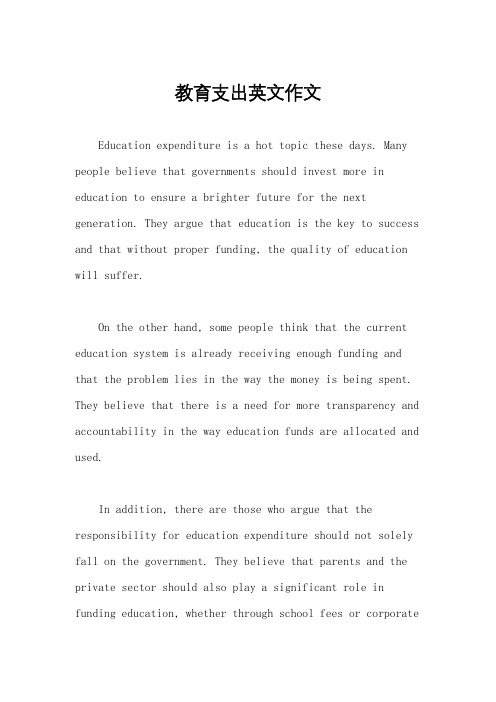
教育支出英文作文Education expenditure is a hot topic these days. Many people believe that governments should invest more in education to ensure a brighter future for the next generation. They argue that education is the key to success and that without proper funding, the quality of education will suffer.On the other hand, some people think that the current education system is already receiving enough funding and that the problem lies in the way the money is being spent. They believe that there is a need for more transparency and accountability in the way education funds are allocated and used.In addition, there are those who argue that the responsibility for education expenditure should not solely fall on the government. They believe that parents and the private sector should also play a significant role in funding education, whether through school fees or corporatesponsorship.Furthermore, there is a growing concern about therising cost of education, especially in higher education. Many students are struggling to afford tuition fees and are forced to take out large loans, which can have a long-term impact on their financial well-being.Moreover, there is a need to address the disparities in education expenditure between urban and rural areas. Many rural schools lack the resources and facilities that urban schools have, which can have a negative impact on the quality of education for students in those areas.In conclusion, education expenditure is a complex issue with various perspectives. It is important for governments, parents, and the private sector to work together to ensure that adequate funding is provided for education and that it is used effectively to provide quality education for all.。
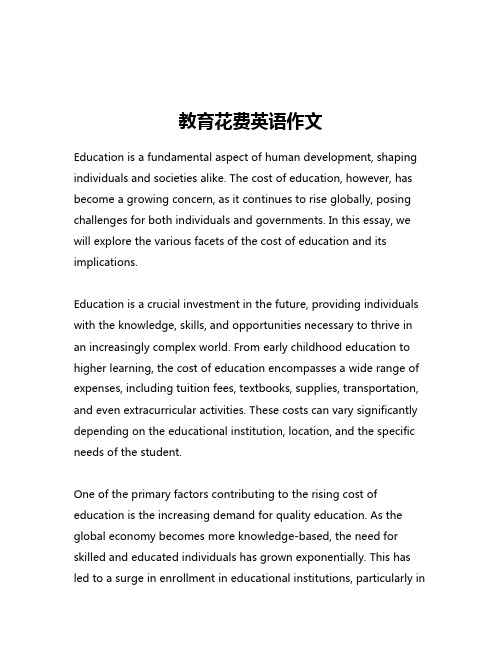
教育花费英语作文Education is a fundamental aspect of human development, shaping individuals and societies alike. The cost of education, however, has become a growing concern, as it continues to rise globally, posing challenges for both individuals and governments. In this essay, we will explore the various facets of the cost of education and its implications.Education is a crucial investment in the future, providing individuals with the knowledge, skills, and opportunities necessary to thrive in an increasingly complex world. From early childhood education to higher learning, the cost of education encompasses a wide range of expenses, including tuition fees, textbooks, supplies, transportation, and even extracurricular activities. These costs can vary significantly depending on the educational institution, location, and the specific needs of the student.One of the primary factors contributing to the rising cost of education is the increasing demand for quality education. As the global economy becomes more knowledge-based, the need for skilled and educated individuals has grown exponentially. This has led to a surge in enrollment in educational institutions, particularly inhigher education, putting a strain on resources and driving up costs.Moreover, the cost of education is not limited to tuition fees alone. The indirect costs associated with education, such as housing, food, and living expenses, can also be a significant burden for students and their families. This is especially true for those pursuing higher education, where the cost of living near campus can be significantly higher than in other areas.The impact of the rising cost of education is far-reaching, affecting individuals, families, and society as a whole. For many, the high cost of education can be a barrier to accessing quality education, limiting their opportunities for personal and professional growth. This can perpetuate cycles of socioeconomic inequality, as those from low-income backgrounds may be unable to afford the cost of education, further widening the gap between the haves and the have-nots.Governments and policymakers have attempted to address the issue of the rising cost of education through various initiatives, such as student loan programs, scholarships, and subsidies. However, these measures have had varying degrees of success, and the problem persists in many parts of the world.One potential solution to the high cost of education is the increased use of technology in the educational sector. Online and distancelearning programs, for example, can provide more affordable access to education, reducing the need for physical infrastructure and transportation costs. Additionally, the development of open-source educational resources and the use of digital textbooks can help alleviate the burden of textbook expenses.Another approach to addressing the cost of education is to focus on improving the efficiency and cost-effectiveness of educational institutions. This may involve streamlining administrative processes, optimizing resource allocation, and exploring innovative funding models that leverage public-private partnerships or community-based initiatives.Ultimately, the cost of education is a complex issue that requires a multifaceted approach. Policymakers, educational institutions, and individuals must work together to find sustainable solutions that ensure access to quality education for all, regardless of socioeconomic status. By investing in education and making it more affordable, we can empower individuals, strengthen communities, and build a more equitable and prosperous future.。

教育花费英语作文As we can see from the picture that nowadays, the phenomenon of Education Pays has aroused wide concern among the people who care about the young peoples future. Especially to the young generation living in the big cities, they tend to put the pays to the first place but not the degree, ignoring the fact that this behavior may pose underlying threat to their present career and may even endanger futures.Ample reasons can account for the issue of Education Pays, the following one might be the most critical .For the majority of young people, they have been always considering the education as a bothering thing to do or not a opportunity that can add color to the dull routine of every day life.So,they want to get a job as early as possible.But, as matter of fact, as the picture described, the people who have learned more earn more than others And,in the picture, the ones who have the doctoral degree earn more XXXX than the ones who have only a degree as bachelor.Does anyone maintain the same attitude towards this issue?Definitely not, as a matter of fact, opinions vary from person to person. Some argue that Education Pays is beneficial to doctors, because, by this way,they can earn mare money. However, quite a few people hold the opposite opinion that Education Pays is detrimental to the ones who learn the skills through hard works.But,most of people agree that the demerits of less education far outweigh its merits.。